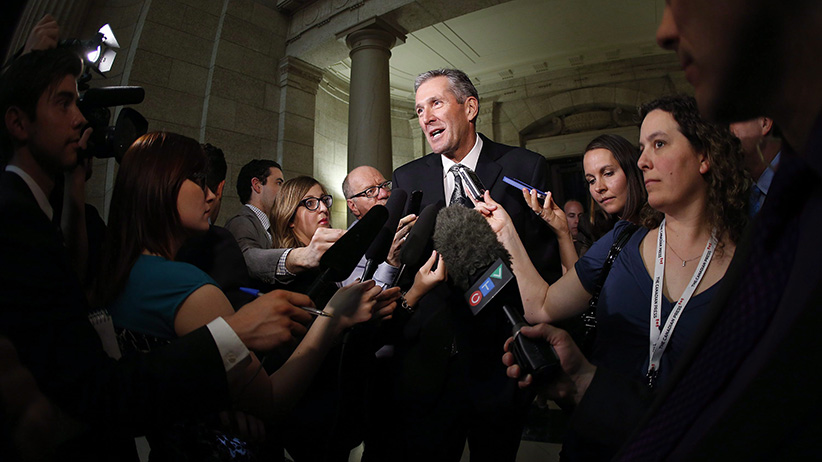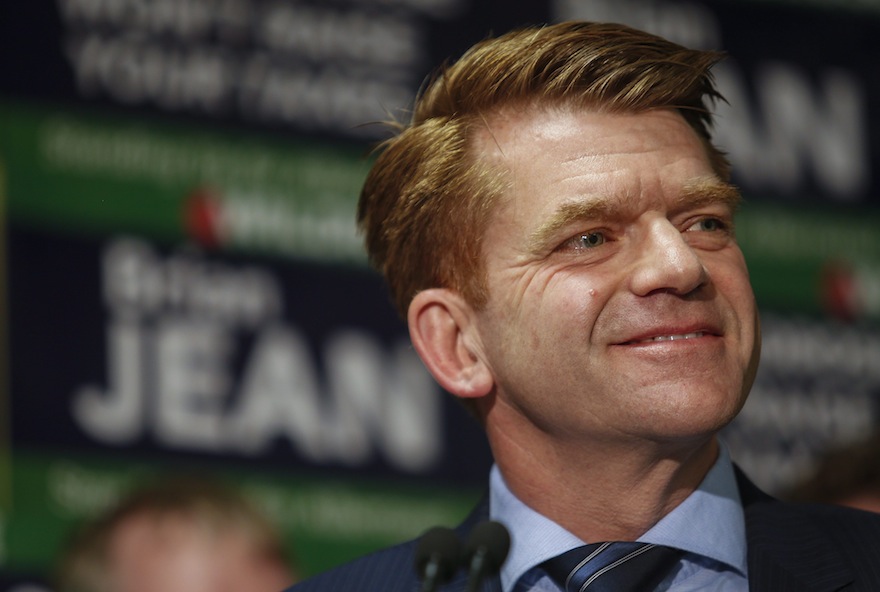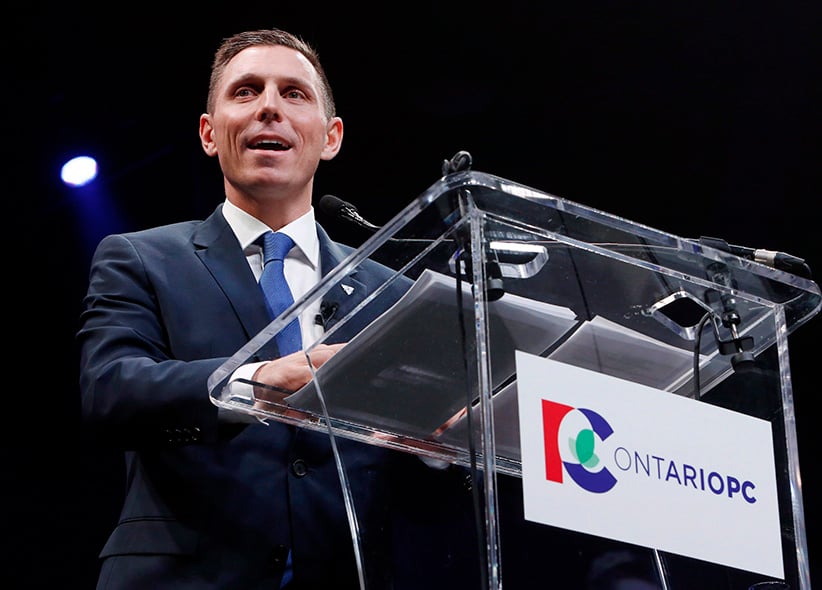Stephen Harper’s last heroes take aim at provincial power
A trio of former Tory backbenchers are plotting to make a few provinces conservative again. First up? Manitoba’s Brian Pallister.
Manitoba Conservative and opposition leader Brian Pallister speaks to media after Manitoba Finance Minister Greg Dewar read the 2015 budget for the province at the Manitoba Legislature in Winnipeg, Thursday, April 30, 2015. THE CANADIAN PRESS/John Woods
Share

Daylight pouring in through a downtown Winnipeg window illuminates the right side of Brian Pallister’s smile and squint as Manitoba’s premier-in-waiting explains his background. He grew up on a small farm. Mom was a teacher. “And every day she inspired us to learn—so much so that my sister and I became teachers too,” the Manitoba Progressive Conservative leader says in the election TV spot.
Pallister’s days teaching social studies at William Morton Collegiate in Gladstone, Man., ended in 1979, after a couple of years. From there, he heeded callings with less obvious ballot-box appeal to a centrist Manitoba voter: the insurance and investment business, then the cabinet of Gary Filmon’s provincial Tory government in the 1990s and, in the 2000s, on the federal Canadian Alliance and Conservative benches.
Manitoba’s opposition Liberals and long-governing NDP have sought to highlight those less-promoted parts of Pallister’s CV, with harsh references to the Filmon austerity days and his vote as an MP against same-sex marriage. Not surprisingly, Pallister, who is likely to win Manitoba’s April 19 election, prefers to look forward, not backwards. He’d really rather not discuss what he’s learned, good or bad, from serving under Stephen Harper’s leadership. “It’s not a question of any disrespect whatsoever, to the former prime minister, who I think is a fine Canadian, okay?” he says in an interview. “It’s more that I’ve also learned tremendous amounts from my basketball coach in college. I’ve learned tremendous things from my phys ed teacher in high school.”
Pallister has publicly dropped his opposition to gay marriage and pledges no front-line cuts as premier. But for Canadian conservatives, after a lengthy losing streak in all provincial contests (except Saskatchewan) and Ottawa, the Manitoba Tory’s anticipated return to power marks the beginning of what they hope is a gradual tide shifting against the more deficit-tolerant progressive activists.
Pallister is the first of three would-be premiers who are familiar, albeit not too prominent, faces for Conservatives: Pallister, Patrick Brown in Ontario and Brian Jean in Alberta were all Harper backbenchers who never got cabinet jobs before seeking top roles in provincial opposition as their pathway to greater influence.
“They made that decision to jump down and be the big fish in a smaller pond, but at least they were masters of their own fate,” says Quito Maggi, a pollster with Mainstreet Technologies. They all lead in provincial polls but the leaders tend to be less popular than their parties, and most voters wouldn’t likely know much if anything about their federal ties, he says.

Others have pond-hopped before from Ottawa to provincial leadership, but they’ve tended to be high-ranking ministers or party bosses: Lucien Bouchard in Quebec, Brian Tobin in Newfoundland, and the disastrously short-lived Alberta rule by Jim Prentice, who confirmed that bold-faced background doesn’t ensure triumph. “People sometimes think they’re looking for a saviour. Brian, Patrick and me, we’re just hard-working guys,” Jean tells Maclean’s.
Pallister was acclaimed as Manitoba’s chief Tory in 2012 after three leaders lost four times to the NDP; Brian Jean bested an Alberta Wildrose MLA and a former county mayor in a snap race after Danielle Smith led a mass party defection before last spring’s election; Brown topped a string of Ontario PC legislators despite having a much smaller support base among their caucus than from his own federal crew.
The three of them all left Harper’s back rows before October’s electoral demise, Pallister back in 2008. But others newly in the political wilderness have joined their sides: defeated St. Catharines MP Rick Dykstra has become Ontario PC president, while former MP Steven Fletcher is vying for a seat on the Winnipeg turf that was part of his federal riding.
Pallister invited Fletcher to join the team, but interim Conservative leader Rona Ambrose did the persuading. “The essence of that conversation was: ‘Steven, the best thing you can do for the conservative movement in Canada is to help create a Conservative government in one province,’ ” Fletcher says.
Among this new provincial Tory class from the Commons, only Fletcher has cabinet experience, with stints as minister of state for transport and democratic reform. “Let’s be honest: cabinet ministers are not picked from the pool of the most competent,” says Jean, a hockey-playing pal to Brown. The three leaders can all boast they were parliamentary secretaries, but that afforded neglible profile on a Harper team where even some ministers could too easily disappear standing in front of wallpaper.
“Ottawa’s tough for a backbench MP. It’s not a glorious life,” Fletcher says. “The provincial route provides opportunity to express yourself and bring forward ideas you can’t do in the federal context.”
Pallister has toyed with leadership aspirations at one level or another for much of his political career. After two provincial terms and a federal loss, he ran for the 1998 federal PC crown on a soft unite-the-right platform, and finished fourth. He then won as a Canadian Alliance MP for Portage–Lisgar and briefly kicked tires on a bid to run the nascent Conservative Party of Canada when it formed. Days after that team won government in 2006, he declared he didn’t want to be considered for Harper’s cabinet because he might run for an opening at the Manitoba PC helm, though he stayed put in Ottawa until the next election. When that Manitoba job became available again in 2012, only he applied. “I’ve been sucked back into politics again,” Pallister later declared.
Premier Greg Selinger and the NDP have done a masterful job of wounding their chances at a fifth straight term in power. Selinger raised the PST by a point in 2013 after promising in the election not to, upsetting even his own cabinet. Several members quit in public revolt a year later and urged Selinger to step down. He instead fought another leadership race and hung on by 33 votes. Recent polls show the NDP in second place ahead of the long-obscure Manitoba Liberals, who enjoyed a halo effect after Trudeau’s victory. “I learned a long time ago in sports that the way you up your game is you play against the best opposition you can find,” Pallister says. “And the NDP—look, they don’t even like one another,” he says.
Hoping to limit the downfall, the NDP is offering policies to protect its base, and warning that Pallister’s past shows he is too right-wing for Manitoba. “Our slogan isn’t, ‘don’t let Harper happen here,’ but it could be,” says campaign director Jeremy Read. The party is aware that while Harper plays poorly in Manitoba’s Indigenous communities and Winnipeg’s core, the ex-PM’s name is still respected in rural areas they’d rather not completely cede. Besides, attacks that hearken further back to the Filmon days packed more punch in the NDP’s pre-election testing.

The Trudeau Liberals won the popular vote and seat count in both Manitoba and Ontario, and Kathleen Wynne’s forces continue to paint a blue target on Brown’s back. “Despite Mr. Brown saying that he’s taking a very moderate approach, when you look at the facts, he’s surrounding himself with all his old Harper friends,” MPP Marie-France Lalonde told the Toronto Star after Dykstra became party president.
Brown has tried to renew the brand, controversially (among his own ranks) promising a carbon-pricing plan and new ads in which he directly lifts a Trudeau line: “I believe that better is always possible.”
Related: Evan Solomon on Patrick Brown and a real PC renewal
In Alberta, where conservatism still controls the federal map, Jean can still declare Harper the country’s best-ever PM and loudly decry Trudeau’s $29.4-billion deficit and lack of pipeline advocacy. Pallister, meanwhile, praised the budget’s infrastructure and First Nations commitments.
The Manitoba leader says he’ll welcome collaborating with fellow leaders and politicians of any political stripe, and he’s no Harper clone. “I don’t handle well on a leash, and Stephen will be the first guy to tell you that. We had lots of disagreements, as thinking people do.” But like his last political boss, Pallister has had to bridge the divide between small-town righties and city moderates, and has been “very effective controlling his caucus and candidates,” notes Winnipeg political author Christopher Adams. The leader’s reputation for a tight ship has come along with many staff jumping ship.
The three haven’t conveyed the obsessive communications control their ex-leader held—Jean says that was a useful negative example he learned from Harper—but a move into government can often shift those tendencies, and pre-election moderation doesn’t always endure, either. Unless fortunes shift, these three former backbenchers stand to win elections in Manitoba, then Ontario in 2018 and Alberta in spring 2019.
Trudeau currently faces a panel of Liberals and NDPers in the many premier summits and provincial consultations he has convened—Saskatchewan’s Brad Wall being the lone outlier. The PM may grow less fond of those sitdowns if Pallister starts a trend and the premiers’ table begins to fill with members from the team that used to spend question period heckling Trudeau’s side.